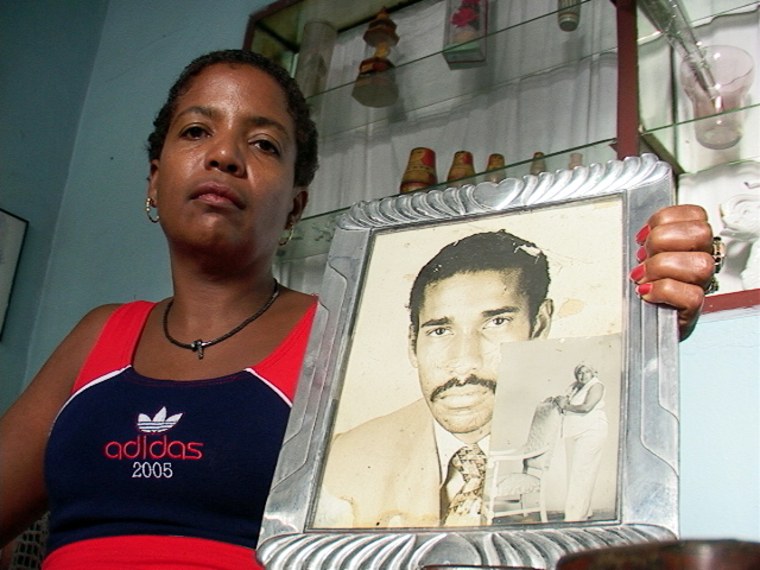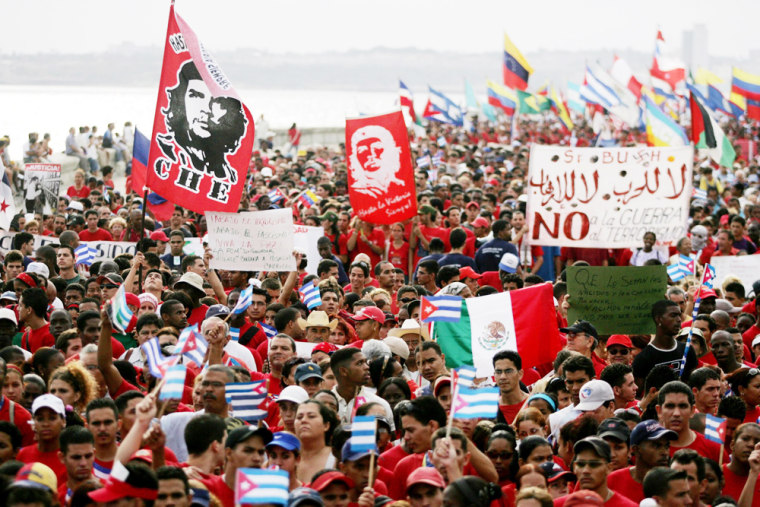Almost three decades have passed since Mercedes Martínez lost her brother in a terrorist bombing of Cubana de Aviacion’s Flight 455 off the coast of Barbados. But she and other family members refuse to forget the dead or forgive those believed to be responsible.
“I demand justice,” said Martínez.
She carried a poster of her brother and marched in front of the American Mission here in Havana on Tuesday.
Joining the “March Against Terrorism,” a government-organized protest that drew hundreds of thousands of people, Martínez called on U.S. authorities to arrest the man she believes to be the mastermind behind the 1976 bombing, Luis Posada Carilles, and extradite him to Venezuela to stand trial.
Posada, who escaped from a Venezuelan jail while prosecutors appealed an innocent verdict, has repeatedly denied involvement. In March, the CIA-trained explosives expert surfaced at an undisclosed Miami, and weeks later he requested political asylum in the United States.
But shortly after the huge march in Havana, the U.S. Department of Homeland Security detained Posada in Miami, his friend and benefactor, Santiago Alvarez, told The Associated Press.
Hours earlier, Posada, 77, told reporters he was willing to leave the United States and abandon his asylum request, but he was detained before he could leave, Alvarez said.
"There's no reason for them to detain him, but that's the part of the process in this country," Alvarez said.
Castro leads march
In Cuba, Posada's presence on U.S. soil triggered a high-profile campaign designed to embarrass the Bush administration into finding and arresting Posada.
Tuesday's march snaked along the Havana waterfront for miles and shut down the Cuban capital until the early afternoon. Fidel Castro, 78, led the march, carried live over national TV in hours usually reserved for educational programming.
His brief remarks were heard across the downtown area through dozens of speakers set up for the event.
Blaming Posada for committing “dozens” of acts of terrorism including in the United States, Castro said, “thousands of Cubans either lost their lives or were maimed as a result of these cowardly loathsome acts.”
The accusations echo the Cuban president’s earlier challenges that his government has been the target of a “U.S.-based terrorist network” responsible for acts of terrorism that include bombing airline offices and assassinating diplomats.
During some 20 night-time television appearances on the Posada case, Castro has also implicated another Cuban exile, Orlando Bosch, currently residing in Miami. Despite a Justice Department assessment describing him as a “terrorist, unfettered by laws or human decency,” Bosch received a presidential pardon by former President George H.W. Bush in 1989.
Vengeance for brother
Martínez would be happy to see both men stand trial for her brother’s murder, even though a Venezuelan court has already exonerated Bosch.
But newly declassified FBI papers obtained by the National Security Archive, a non-governmental, non-profit organization, identified both Posada and Bosch as the masterminds of the Cubana airline bombing in addition to linking them to other terrorist acts at the time.
The unnamed confidential source "all but admitted that Posada and Bosch had engineered the bombing of the airline," the FBI memo said.
“My brother’s death destroyed my family,” said Martínez. When he boarded Cubana Flight 455, Armando Martínez was just 25 and a rising trainer for the junior fencing squad. He and the team were flying home to show off the gold they won at a Central American Fencing Championship.
“Everything changed. Afterwards, there was no life in this house,” remembers Martínez.

The whole household fell into depression but Martínez's mother never recovered.
Before her death in 1995 she had been committed to a psychiatric hospital some 30 times. “She would see a young black man on the street and cry out ‘my son!’ After Armando died, she had no life. He had been her life.”
Time has not eased the sister's grief. “Every day the sadness grows," said Martínez, haunted by the life her brother could have led.
“Recently when Fidel was speaking about a woman from Guyana who lost her brother on the plane, I found myself crying after all these years. For what happened to this house. For all the other families. For the life my mother led after my brother’s death.”
Angry, she is also honest about her feelings toward Posada. “I hate him. People say that it’s better not to be vengeful but I can’t help it even though I know it won’t bring Armando or my mother back. Almost 30 years have passed and that person is allowed to exist as if nothing happened. It is very hard, very hard.”
